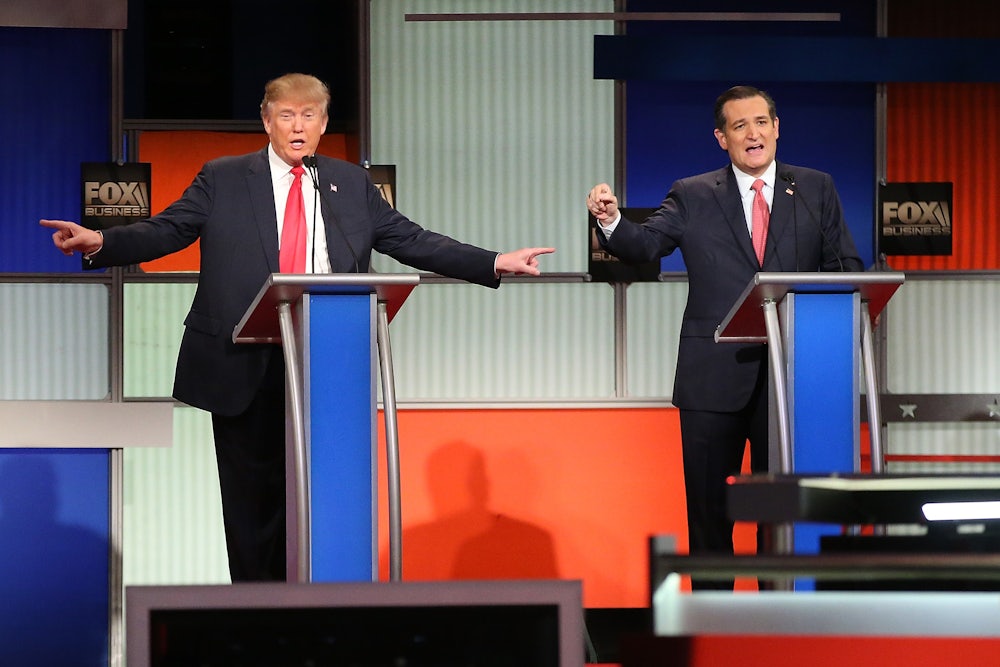As those who watched, listened to, read, or read about last Thursday night’s GOP debate will know, Donald Trump, of all people, pulled off one of those “had the best response” moments. Ted Cruz had been going around saying that Trump had “New York values,” and was asked to spell out what that meant. After Cruz had finished insulting wide swaths of the population, Trump turned Cruz’s words against him: “When the World Trade Center came down,” the real estate developer began, and that was all he needed to say. Rhetorically, it was as if he’d transformed himself into a Donald Trump-sized flag lapel pin. He, as the kids or headline writers say, had the best response.
Though I took pleasure in watching Cruz squirm—and wondered how, exactly, no one had come up with that retort sooner—I couldn’t quite join the chorus praising Trump for what was widely viewed as an out-of-character dip into non-awfulness. Evoking the memory of September 11—even of the city’s response—is a pretty tepid defense of New York or New Yorkers. Is the best that can be said of the place that it didn’t deserve to be the victim of a horrific, unprecedented terrorist attack? As much as it would have been fun (if hypocritical) if he had, Trump didn’t stand up for multiculturalism, immigration (ha!), social libertarianism, or lively squabbles on the crosstown bus. He didn’t defend New York values, whatever those may be. He nimbly talked around that topic.
What was so frustrating about Trump’s response to Cruz—or maybe the praise it elicited—was that it accepted Cruz’s premise that New Yorkers are un-American. Trump’s retort put city-dwellers into that special enemy-of-my-enemy category: people who are praiseworthy because Islamists have it in for them. Victims, who, in their non-victim moments, lose their allure. See also: Parisians after the attacks in November and the Charlie Hebdo shooting in January. See also, and more relatedly: Israelis. The Jewish state is quite a thing for American conservatives, and not because of some kind of cultural affinity between the GOP base and… anyone from settlers to Tel Aviv hipsters. Actual Israelis probably wouldn’t appeal. But oh, the idea of Israel… I think you know where this is going.
Writing in the New Yorker, Adam Gopnik produced what was surely the most counterintuitive take on Cruz’s New York values comment:
[A] ruthless opportunist is attacking New York without even throwing any shade at all at the Jews. For the first time in modern history, a right-wing opportunist has attacked New York values without being even subliminally anti-Semitic.
The only possible explanation, as far as I can tell, is microaggression-fatigue: So exhausting is the thing where you notice that your kind is being discreetly insulted, so predictable are even the strongest think-pieces to that effect when it comes to changing society, that the only thing left, the only strategy, is to pretend that dog-whistles are not that. (Gopnik is not only Jewish, but is also, as per his own essay, well acquainted with the history of the “New York” euphemism.) Rather than calling it out, maybe the thing now is to swing back to not seeing bigotry. But perhaps that’s only a thing when it comes to bigotry against Jews—part of the somewhat older tradition of Jews not ‘seeing’ anti-Semitism, so as to preempt accusations of hypersensitivity.
Or maybe it’s not a thing at all. On Jezebel’s elections blog, Joanna Rothkopf’s post about the exchange ran with the to-the-point headline, “Ted, Just Say ‘Jewish.’” Rothkopf’s close reading of Cruz’s extended remarks—the stuff about “media,” and the exception made for New York state—supports her theory. It’s worth remembering that Trump, for all his Archie Bunker-ness, is the father of a (high-profile) Jewish daughter. No, he’s not Jewish (she types, with a sigh of relief), but he’s Jewishness-adjacent enough that sloppy, carry-over anti-Semitism can hit him as well.
As best as I can tell, Gopnik’s only reason for seeing Cruz’s euphemistic ramblings as devoid of anti-Semitism is that Trump himself doesn’t seem very New York. But if Gopnik’s right about this—if he’s right that Trump seems more like what a non-New Yorker would think a rich New Yorker would be like than someone Gopnik would recognize—how does that change things? Who is Cruz, and more to the point, who’s his audience?
There will never be any official word on whether Cruz’s flagrant anti-Semitism was what it so obviously was. Thanks to Ted Cruz’s favorite phenomenon, political correctness, it’s not socially acceptable to say Jews when you mean Jews, so the symbolic collateral ends up being an enormous city, and its suburbs, and a state that shares its name, and people who grew up or have family in any of these locales. And also: September 11, and anybody for whom that date strikes an emotional chord.
The question, then, isn’t whether “New York values” is a euphemism for “Jewish,” but rather, what a Republican in 2016 would have to gain by insulting Jews. Could it be that anti-Semitism is still a thing, and that it’s alive and well on the right? If so, what’s its function these days, in that context?
There I can only speculate. It could be anticipating the possibility of a Sanders candidacy. Or it could be—as it so often is—not really about any specific Jews at all, but about the eternal fantasy that a nation’s problems could be solved, if only this one, an inherently inauthentic element could be rendered powerless.
As with all entries in the had-the-best-response genre, the hero put his foot in it. Trump tweeted a photo of September 11 wreckage to Cruz, transforming what had been a somber response into an overt political exploitation of tragedy. And then along came Sarah Palin of all people, offering the anti-coastal-media-elite stamp of approval. This, if nothing else, should clear up matters regarding whether or not Trump much values New York.
